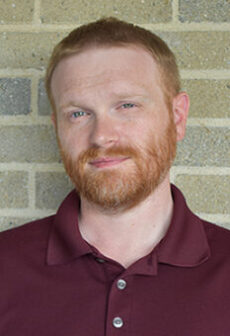Christ the King rules all of creation with power and love in ‘covenant fidelity’

Shawn Reeves
Living the Word l Shawn Reeves
Solemnity of Our Lord Jesus Christ, King of the Universe l Nov. 20
2 Samuel 5:1-3; Psalm 122:1-2,3-4,4-5; Colossians 1:12-20; Luke 23:35-43
Self-preservation is one of the most powerful forces of human nature. When we (or those we love) are threatened, we find ourselves doing things we otherwise would not do — sometimes heroically and sometimes nefariously. We have a fundamental need to exist and continue existing, and it directs so many of our decisions. When most imagine what it would be like to be a king, we imagine extensive wealth and unbridled power, which is, in a way, just another way of saying unhindered self-preservation.
This, at least, is certainly the attitude of all three groups jeering at Jesus on the cross in today’s Gospel reading. Accustomed (in their own experiences) to kingship being a demonstration of power over all threats, the rulers and soldiers both demand a spectacle of radical self-preservation as evidence of Jesus’s kingship. Even the first criminal expects this as the only legitimate proof of Jesus’s status as “King of the Jews” and the only cause for hope in Jesus securing the criminal’s preservation, as well.
Only the second criminal recognizes that absolute self-preservation is not supreme power. The power of Christ’s kingdom is not in the material preservation of the self but in the spiritual preservation of all of creation.
UNITING CREATION
In the hymn-like celebration of Jesus found in our second reading, St. Paul refers to Jesus as “firstborn of all creation,” a Jewish legal term designating Jesus as the rightful recipient of all of creation as his natural inheritance. But, as St. Paul goes on to proclaim, not only does Jesus rightfully receive all of creation but he unites it and “holds” it together. He is “preeminent” in all things precisely in the fact that “all things were created through him” and have their reference back to him. If anything exists in the universe, it does so because he is actively “holding” it together in power and love.
Jesus Christ is King of the Universe not merely in wielding power over it but in infusing his power and life into it. He creates and he preserves.
In our first reading, we have in King David a kind of “type” of Christ, a foreshadowing on the reign of Jesus. Like David, whose people announce “we are your bone and your flesh,” so Jesus also shares in our flesh and blood (Hebrews 2:14). As the Lord awards David title as “shepherd” over Israel, so Jesus also takes this identity (John 10:14). And the “agreement” that David makes with Israel can equally be translated as “King David made a covenant with them there before the Lord,” a prefiguring of the covenant Jesus makes upon the cross (Luke 22:20; Hebrews 9:15).
Even in his anointing, David points toward the kingship of Jesus, as “Christ” simply means “anointed one” (the Greek equivalent of the Hebrew Messiah). The christ (anointed) David, then, is a living prophecy of the Christ Jesus.
WE HAVE BEEN “RECLAIMED”
Jesus Christ is King of the Universe not merely in wielding power over it but in infusing his power and life into it. He creates and he preserves. His creation falters and he redeems it. This is covenant fidelity. St. Paul instructs that “He delivered us from the power of darkness” and “transferred us to the kingdom of his beloved Son.”
We tend to think of ourselves as foreign to the kingdom of Christ, imaging that we were brought into that kingdom like refuges from another land. But St. Paul’s words depict us as reclaimed citizens, subjects captured by an enemy and then returned to their home. In both Hebrew and Greek the term we translate as “redemption” connotes a return of something through a ransom payment. We were “transferred” to Christ’s kingdom because the King confronted the “power of darkness” and reclaimed his people, restoring them to His kingdom by the blood of his cross, so that “all things hold together” in him and all things are reconciled through Him.
We have been restored to the House of the Lord. Let us go rejoicing to our King who has remembered us and awaits us in Paradise.
—
SHAWN REEVES is the director of religious education at St. John’s Catholic Newman Center in Champaign. He and his family attend St. Elizabeth of Hungary Church in Thomasboro.





